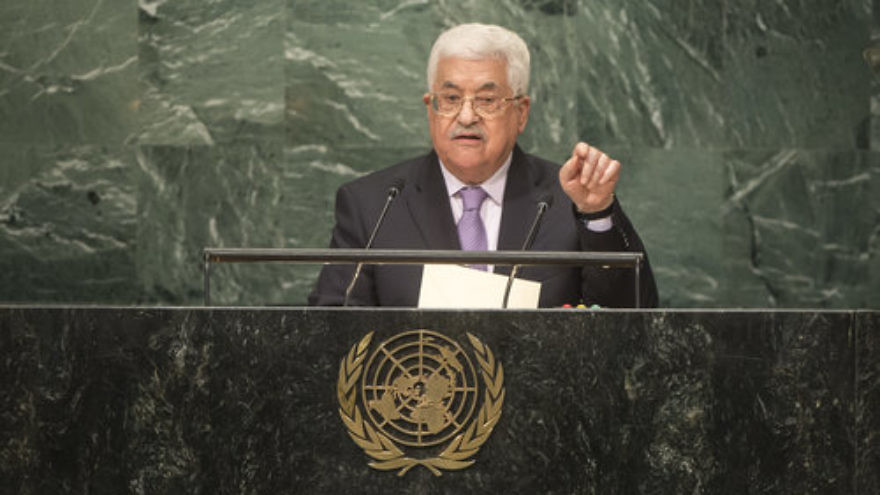“Peace be upon you.”
Palestinian President Mahmoud Abbas uttered these hospitable words to conclude a hostile speech against his usual suspect, namely Israel, in a pre-recorded speech to the United Nations General Assembly. If Abbas means what he says, which we can rarely count on, Israel and the Palestinians will probably never settle their differences.
He is demanding that Israel cede its territories to the Palestinians within a year or he might withdraw recognition of Israel. However deafening his bark, he may have no intention of biting Israel. Former U.S. Rep. Robert Wexler undercut Abbas’s message to the world in a New York Times op-ed which recounts Abbas’s own personal interactions with Israeli leaders to advance their relationship.
In his address to the U.N. last Friday, Abbas demanded that Israel turn over its territories to the Palestinians within a year or he would reconsider recognition of Israel, according to the Associated Press.
“If this is not achieved, why maintain recognition of Israel based on the 1967 borders?” he asked. “If the Israeli occupation authorities continue to entrench the reality of one apartheid state as is happening today, our Palestinian people and the entire world will not tolerate such a situation.”
They will not tolerate?
Abbas “proved once again that he is no longer relevant,” retorted Israeli Ambassador to the U.N. Gilad Erdan. “Those who truly support peace and negotiations do not threaten delusional ultimatums.”
Erdan is right. Why would Israel “tolerate” such a demand? Anyone who has followed this conflict for any length in the last 73 years would be pessimistic of a settlement even in the distant future. Let Abbas withdraw recognition. Would it make matters any worse than now?
Was Abbas serious? Hard to say, which brings us to a significant reason why many believe a peace deal is a long way off. As others have suggested, Abbas was probably posturing for a bloodthirsty audience that seeks to drive the Jews into the sea.
Abbas may fear, like his predecessor Yasser Arafat, that a segment of Palestinians will revolt if he enters into a reasonable settlement with Israel, and along with it they will try to assassinate him. It is no simple matter to quantify how many Palestinians want to destroy Israel and how many are willing to live in peace with Israel. No matter their percentage, Palestinians who seek the entire land could present a violent obstacle.
And that brings us to another reason for the Palestinians’ current plight. Rep. Ilhan Omar inadvertently touched on the core of the problem when, in a Times of Israel report, she tweeted her warped message last week, “We…continue to provide Israel with funding without addressing the underlying issue of the occupation.”
One “underlying issue of the occupation” has always been Arafat’s rejection of Israel’s proposal for an independent state during a summit at Camp David 21 years ago. Israel suggested a state to include Gaza, most of the West Bank and part of Jerusalem. Had the two sides reached an agreement on this basis, would the situation be such a mess today?
Presumably, Omar defines “the underlying issue” differently.
It is true that the new Israeli prime minister, Naftali Bennett, has proclaimed that he will never support a Palestinian state, but he will attempt to build the Palestinian economy. Israelis have elected hardliners after the Palestinians initiated military confrontations with Israel.
A two-state solution appears to be the most practical answer to the conflict, but I have long doubted it will work out. At the very least, the two sides should consider other options. However, a two-state solution would be adequate if it can succeed.
Wexler writes in the Times that he sat in on meetings this past summer in Ramallah in the West Bank with top Israeli and Palestinian leaders – Abbas, Bennett, Defense Minister Benny Gantz and Mohammad Shtayyeh, prime minister for the Palestinian Authority. Contrast this to President Clinton’s shuttle diplomacy at Camp David sans face-to-face meetings between Arafat and Israeli Prime Minister Ehud Barak.
“It’s my understanding, based on those meetings, that both sides are committed to making progress for the first time in years,” writes Wexler, who is now president of the S. Daniel Abraham Center for Middle East Peace.
Outside forces are making it possible for Israel and the Palestinians to work together – Israel’s new governing coalition, which is already easing conditions for the Palestinians; the governance transition in America from Presidents Trump to Biden; and pressure on the authority from Arab nations involved in the Abraham Accords, which normalized relations between Israel and its Arab neighbors, as Wexler indicates.
Besides the Palestinians, the new Israeli government is reaching out to its other avowed enemy, the Democratic Party. Even before Trump’s election in 2016, former Prime Minister Benjamin Netanyahu had partnered with the Republican-controlled Congress while ignoring Democrats.
“By helping to create more of a two-state reality on the ground, rather than prematurely pushing a comprehensive settlement,” Wexler notes, “the Biden administration can both preserve the opportunity for a two-state outcome and unify the Democratic Party, except for a few outliers.”
Wexler’s op-ed bears the earmarks of a trial balloon intended to gauge reactions of Israelis, Palestinians, and others. Let’s hope the reception is free of static.
Republished from San Diego Jewish World

























